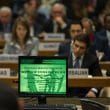Using neuroscience technologies in court
By Jonathan Moreno, September 24, 2008
The recent New York Times report that Indian courts have begun accepting a version of electroencephalograms (otherwise known as EEGs) as evidence of deception or the absence of deception speak to the urgency of these discussions and to the importance of this roundtable. A few poorly informed American judges could also naively find this technology informative; certainly the issues concerning its utility are esoteric enough, and few people have been educated about them. Intelligence officials and/or operatives, operating under the cover of national security, might also decide that the potential gain in information outweighs the uncertainty of these technologies.
Considering the Defense Department’s 1950s experiments with LSD and other hallucinogens, such a decision would not be surprising. Neuroscientists need to speak with one voice about the injustices that may be done given the current state of the science, whatever their views about the ultimate prospects for such technologies.
Topics: Biosecurity
Share: [addthis tool="addthis_inline_share_toolbox"]














